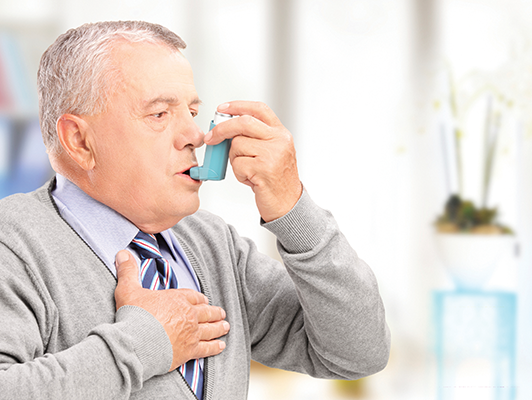5 ways to manage COPD
If you have COPD, there are lots of steps you can take to feel your best and prevent the disease from progressing. Here are five of the most important things you can do, according to Donna August, RN, a care manager with UPMC Health Plan.
1. Prevent your lungs from getting irritated.
Irritants that can trigger COPD symptoms include smoke, chemical fumes (from cleaning products), dust, and air pollution. Here are some ways that you can minimize exposure to these irritants:
- Monitor weather reports for air quality and pollen counts. On days when air pollution or pollen levels are high, stay inside if possible. Close the windows and keep the AC on.
- On hot days, get fresh air first thing in the morning. Extreme temperature can be hard on your breathing. Go for a walk or hit the garden before it gets too hot out.
- Avoid strong cleaning products. Look for chlorine-free cleaners, which are often sold as a “green,” or environmentally-friendly, product.
- Dust with a damp cloth. This is known as “wet-dusting.” Using a dry cloth will cause particles to become airborne, which may irritate your lungs.
- Avoid wearing perfume, and ask friends and family to not wear it around you.
- If you’re a smoker, quit. And ask friends and family not to smoke when you’re around.
2. Prevent respiratory infections.
Winter may be over, but you still need to be vigilant about taking steps to avoid getting sick. A bout of cold or flu can cause a COPD flare-up.
- Be sure you’re up to date on flu and pneumonia vaccines.
- Let friends and family know you love their company, but if they’re under the weather, better to stay in touch online or by phone.
- Wash hands frequently with soap and warm water, especially when you’re out in public.
- If you do start to come down with something, call your doctor or pulmonologist at the first sign of symptoms. It’s normal to minimize a cough or too much mucous, hoping it will go away on its own. But left untreated, you can end up in the hospital.
3. Learn proper breathing techniques.
We encourage people to enroll in a pulmonary rehabilitation program to increase endurance and minimize fatigue. There are two types of breathing you will learn: pursed-lip breathing breathing and abdominal breathing. Learning these techniques helps improve lung function and your ability to do the activities you enjoy without becoming short of breath.
4. Exercise.
Exercise helps increase circulation of blood, which helps your body use oxygen more efficiently. It also improves muscle strength, strengthens the heart, lowers blood pressure, and boosts your mood. It’s always smart to talk to your doctor before starting an exercise program. In general, most experts recommend starting slowly. You could walk for 10 minutes and gradually work up to longer stretches.
5. Eat well.
People with COPD expend a lot of energy just to breathe. If you’re underweight, consider adding a supplement to your diet to ensure adequate nutrition. You may also find it easier to eat five or six small meals a day rather than three bigger meals. Limit sodium, as salt causes water retention, which can make it more difficult to breathe.
Source: Donna August, RN, health coach




